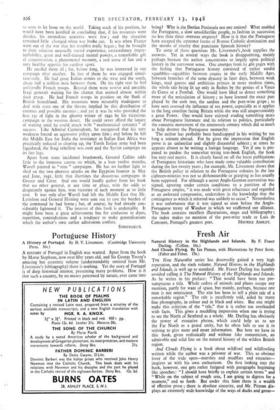Portuguese History
A HISTORY of Portugal in English was wanted. Apart from the book by Morse Stephens, now over fifty years old, and Sir George Young's amusing but eccentric volume (understandably omitted from Mr. Livermore's bibliography) there is nothing. Yet the story of Portugal is of deep historical interest, presenting many problems. How is it that such a country, by no means patterned by nature, ever came into being? Why is the Iberian Peninsula not one nation? What enabled the Portuguese, a slow unsoldierlike people, to fashion in succession no less than three overseas empires? How is it that the Portuguese have escaped the extremer forms of Roman Catholic domination and the streaks of cruelty that punctuate Spanish history? To some of these questions Mr. Livermore's ,book supplies the answers. Yet in several ways the book is disappointing, mainly perhaps because the author concentrates so largely upon political history in the narrowest sense. One emerges from its 460 pages with the feeling that Portuguese history consisted of rather sordid squabbles—squabbles between counts in the early Middle Ages, between branches of the same dynasty in later days, between weak kings, mad queens and ambitious princes in more modern times, the whole tale being lit up only in flashes by the genius of a Vasco da Gama or a Pombal. One would have liked to detect something more of the articulation of history ; to have learned the exact part played by the cork tree, the sardine and the port-wine grape ; to have seen assessed the influence of sea power, especially as it applies to the long coastline facing Britain while she was still unquestionably a great Power. One-would have enjoyed reading something more about Portuguese literature and its relation to politics, particularly the romantic movement of the nineteenth century which did so much to help destroy the Portuguese monarchy.
The author has probably been handicapped in his writing by too long a sojourn abroad. For he gives the impression that English prose is an unfamiliar and slightly distasteful subject ; at times he appears almost to be writing a foreign language. Yet if one is pre- pared to pardon the somewhat trying text-book English, the book has very real merits. It is clearly based on all the latest publications of Portuguese historians who have made some valuable contribution during the last twenty years ; for example, Mr. Livermore shows that the British policy in relation to the Portuguese colonies in the late eighteen-nineties was not so dishonourable or grasping as has usually been supposed. For although a secret Anglo-German convention was signed, agreeing under certain conditions to a partition of the Portuguese empire, "it was made with great reluctance and regarded as an awkward compromise, undertaken in the knowledge that the contingency to which it referred was unlikely to occur." Nevertheless it was unfortunate that it was signed so soon before the Anglo- Portuguese treaty of Windsor in which we reaffirmed our alliance. The book contains excellent illustrations, maps and bibliography ; the index makes no mention of the port-wine trade or Luis de Camoens, Portugal's greatest poet. MAURICE ASHLEY.


































 Previous page
Previous page